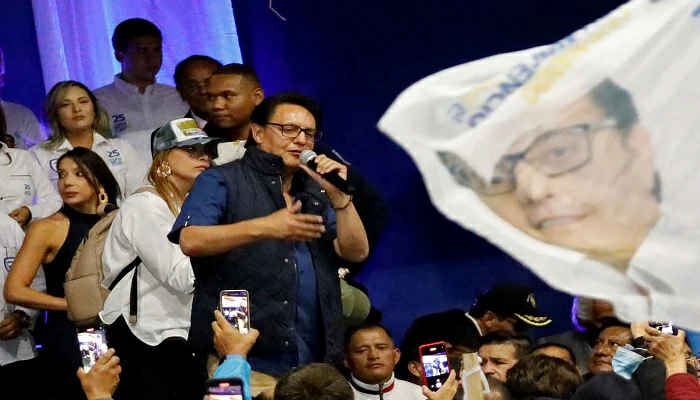One of the eight Ecuadorian presidential candidates on August 20 was assassinated by a hitman on the evening of Wednesday August 9, north of Quito. The country has been placed in a state of emergency for two months. However, the electoral calendar has not been shifted.
Former president of the Parliament’s control commission, where he denounced the corruption of members of the former regime of Rafael Correa, Fernando Villavicencio had recently accused the Sinaloa cartel and political opponents of seeking to kill him. Following this assassination, a state of emergency was declared in the country, but the date of the election was maintained. F. Villavicencio was leaving a political rally when he was attacked, just after getting into his car. A video shared on all social networks shows him surrounded by bodyguards, police and soldiers on the right side of the car, but apparently the killer(s) attacked from the less protected left side of the vehicle. Panic immediately seized all those present who took refuge behind cars or in the building in which the political meeting had just ended.
Aged 59, a former oil trade unionist, journalist and deputy, F. Villavicencio was transported to the nearby Women’s Clinic where the Minister of the Interior Juan Zapata, then his uncle, Galo Valencia confirmed his death. According to the latest polls, F. Villavicencio ranked second in voting intentions with around 13%, according to the Cedatos institute, behind lawyer Luisa Gonzalez (26.6%), close to the left-wing ex-president R.Correa. After the dissolution of Parliament in May 2023, he ran for president, and focused his campaign on the fight against the mafias and the drug trafficking that ravages the country. He had recently accused the Sinaloa Cartel and those close to former President R. Correa of seeking to kill him for fear of his electoral program which provided for the construction of a very high security prison for the main drug traffickers as well as the creation of an elite police unit to tackle cartels.
A hitman was arrested, but he did not survive, according to the Department of Justice. “Organized crime has gone very far, but the full weight of the law will fall on it,” said President G. Lasso before urgently convening a meeting of the country’s top security officials. The state of emergency has been established for sixty days in the country, further indicated the Head of State who declared that “the armed forces are currently mobilized throughout the national territory in order to guarantee the security of citizens, the tranquility of the country and free and democratic elections on August 20”.
When he was an investigative journalist, F. Villavicencio made a name for himself by going out of business on R. Correa. In 2014, he had to take refuge in the Amazon rainforest, after having been sentenced to 18 months in prison – he had accused the president of having ordered an armed operation in a hospital. Two years later, a judge asks for his imprisonment, in question: his use of hacked emails in an investigation into alleged corruption of the company Ecopetrol. He then went into exile in Peru. But it was following one of his investigations revealing a system of corruption that R. Correa was sentenced to eight years in prison. When the latter left the presidency, F. Villavicencio returned to the country, he entered politics and was elected deputy in October 2020.
The European Union “condemned in the strongest terms” the assassination. “The EU reiterates its full commitment to support Ecuadorian democracy and to contribute to efforts to ensure peaceful democratic elections”, even as an EU electoral expert mission is currently in Ecuador, said the EU foreign policy chief Josep Borrell in a statement. “This tragic act of violence is an attack on institutions and democracy in Ecuador […] all candidates for the elections must benefit from rigorous protection measures in order to guarantee a free and democratic electoral process,” the official stressed.
This article is originally published on perspectivesmed.com









